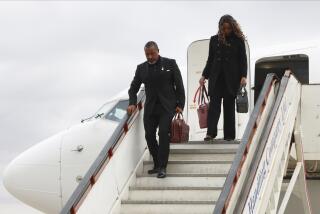Two African Presidents Die in Plane Crash
- Share via
KIGALI, Rwanda — The presidents of Rwanda and Burundi were killed in a plane crash near this capital city’s airport Wednesday as they flew back together from regional peace talks in Tanzania. Rwandan diplomats charged that the plane was shot down.
Presidents Juvenal Habyarimana of Rwanda and Cyprian Ntayamira of Burundi had been in Tanzania for a meeting of east-central African leaders seeking ways to end ethnic violence in the two countries.
Rwanda and Burundi have been racked by bloodletting between the rival Hutu and Tutsi ethnic groups. The deaths of the presidents, both Hutus, are almost sure to inflame tensions in both countries.
The French Embassy in Kigali confirmed that both presidents were killed in the crash. About 10 people were aboard, and there were no survivors, the embassy said. Witnesses heard heavy-weapons fire around the airport shortly before the crash.
“What happened was not an accident but an assassination,” Rwanda’s U.N. ambassador, Jean Damascene Bizimana, told reporters at the United Nations after the 15 Security Council members stood for a minute of silence in an unusual tribute.
The council expressed its “shock and distress” and called for calm while the crash is investigated.
Bizimana said the plane was hit by rocket fire but did not say who attacked.
Francois Ngarukintwali, the Rwandan ambassador in Brussels, quoted the chief of staff of the Rwandan Cabinet, Enoch Ruhigira, as saying that the plane was attacked.
“It was shot down. It’s true. It burned,” Ngarukintwali told the Associated Press, adding that he could not confirm the deaths.
Laura Lane, the economic officer at the U.S. Embassy in Kigali, said she was at her home, about a 10-minute drive from the airport, at the time of the crash.
“There were all kinds of sounds and explosions. We could hear some shots. We did not know what it was, and we were all instructed to stay in our houses, which we did,” she said in a telephone interview.
“It is a terrible, terrible catastrophe for both countries at this very dangerous time,” said a Western diplomat in Burundi’s capital, Bujumbura. “Anything could happen.” But he added that Bujumbura was quiet immediately following the news.
In Bujumbura, a Hutu resident whose mother and father were injured in a grenade attack last month said: “Everyone is hiding indoors and listening to their radios. We fear for our lives and country.”
The African leaders had met in the Tanzanian capital of Dar Es Salaam earlier Wednesday to seek a regional approach to end tensions in Burundi and Rwanda. The deep rivalries between the Hutu majority in both tiny central African states and the Tutsi minority have given both countries bloody histories since before independence in 1962.
Although the Tutsi make up only 15% of Burundi’s population, they controlled the country until President Melchior Ndadaye--a Hutu--won the nation’s first democratic election last June.
Since Ndadaye’s assassination in October, up to 100,000 people have died in ethnic violence and 1 million have fled to other nations.
Ntayamira, 38, was elected president by Burundi’s National Assembly in January, but the Tutsi still dominate the army.
The ethnic hatred has exploded repeatedly since Burundi gained independence from Belgium, with an estimated 100,000 people, mainly Hutu, killed in massacres in 1972. In August, 1988, Hutu farmers along the border with Rwanda staged an uprising.
In neighboring Rwanda, Habyarimana’s Hutu coalition reached a peace accord in August with the former Rwandan Patriotic Front rebels, made up mainly of minority Tutsi, but they have failed to agree on a transitional government.
The latest attempt failed Feb. 22 after two politicians were assassinated by Tutsi fighters. An estimated 2,000 civilians died in 2 1/2 years of war, and nearly 1 million were forced from their homes.
The U.N. envoy to Rwanda, Jacques-Roger Booh Booh, had warned earlier this month that the tiny country faced collapse and a new civil war.
Habyarimana, 57, took power in a bloodless coup in 1973.
More to Read
Sign up for Essential California
The most important California stories and recommendations in your inbox every morning.
You may occasionally receive promotional content from the Los Angeles Times.












